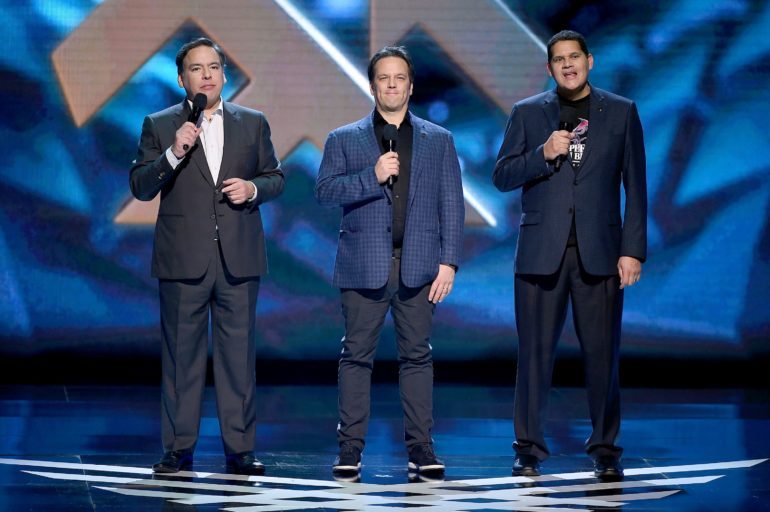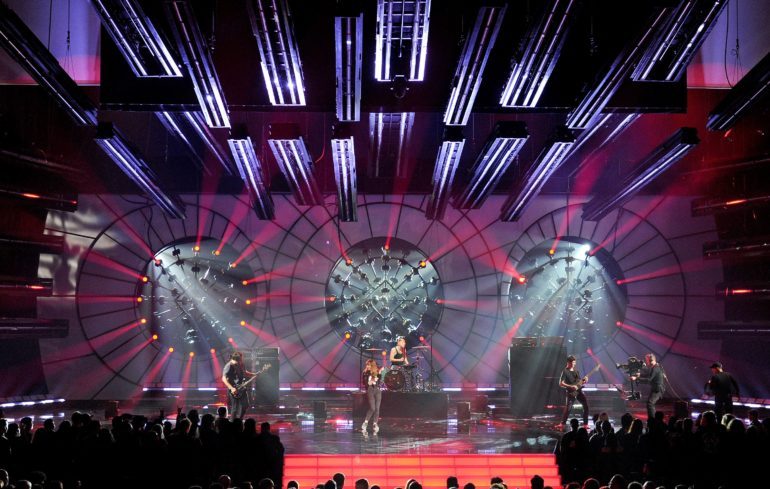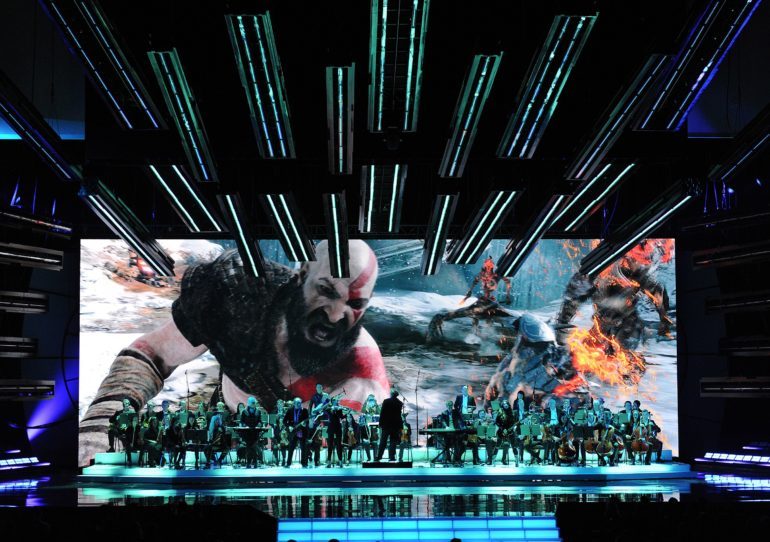Game Awards Creator Reflects on 2018, Beyond as Viewer Numbers More Than Double
By Brian Crecente
LOS ANGELES (Variety.com) – “This show is about bringing everyone together to talk about video games.”
“When I started this show five years my dream was to put competition aside and celebrate what we love which is playing games and making games. This is a moment that has been five years in the making for me, I can’t believe it’s about to happen.”
Keighley — creator, producer, and host of the Game Awards — stands on the precipice of the year’s annual event, facing not just millions of gaming fans tuned in to livestreams from around the world, but the culmination of nearly ten months work. For a moment – just before he announces that the heads of Nintendo, PlayStation, and Xbox are taking the stage together in an unprecedented show of unity — Keighley looks like he might shed a tear.
And then the moment happens and the show moves on. Over the course of about three hours, Keighley played host to the mostly full Microsoft Theater in L.A., presenting presenters, kicking off live musical performances, setting the stage for award announcements, laughing occasional at slight missteps in the cavalcade of entertainment.
With another year wrapped, Keighley usually gives himself a bit of time off before discussions on the next year’s show start and the ever-growing production slowly begins lumbering forward. But for now, chatting on the phone from his home in California, Keighley sounds both content and tired when I ask him about getting those three on stage together.
“To me, that moment represented something only our show can do.,” he said. “It showed unity between competitors and demonstrated that the gaming industry is stronger when its unite.”
In the lead up to this year’s Game Awards, he had been careful to downplay expectations of viewership. Last year’s show saw a 202% increase in viewers — fueled mostly by the expansion to China. It was such a massive leap in viewership that Keighley seemed very aware that this year’s show could be flat or maybe even down, and that might not look good.
So he said he was surprised to discover that the 2018 show numbers didn’t just increase, they lept, up 128% to over 26.2 million global livestreams. By comparison, the 2018 Oscars hit a viewership low with 26.5 million viewers on television, the 2018 Golden Globes were down 5 percent to 18.7 million viewers on television, and the Emmy Awards hit a new viewership low as well , dropping 11 percent from 2017 with a TV viewership of 10.2 million. The comparison isn’t perfect, with one showing a global online audience, and the others showing the North American TV viewership, but it does seem to underline a trend of sorts, one weighted in favor of the Game Awards.
“The fact that we continue to grow amazes me,” Keighley said. “I thought last year was the best we would see, both in terms of audience and response.”
And this year’s growth doesn’t seem tied to any one specific area, he noted. Twitch and YouTube viewers both doubled and viewership was significantly up both domestically and internationally.
“It sort of shows the Game Awards is a massive event for the industry,” he said.
The Thursday night event became one of Twitch’s biggest livestreams to date with more than 1.13 million concurrent viewers watching the program at its peak on the service. On social media, The Game Awards was the top worldwide trend on Twitter for the fourth year in a row, with the #TheGameAwards hashtag usage up 1.6 times over 2017 and overall conversation was up 1.9 times year-over-year with more than 1.8x the number of unique authors. On the Chinese social platform Weibo, Game Awards related posts achieved more than 56 million views from 310K unique individual postings.
The opening moment of this year’s show was doubling impactful for Keighley. It not only finally brought together the heads of the three major consoles on one stage on his show to welcome the world of gaming to an annual celebration, it also delivered famed composer and producer Han Zimmer to the stage to perform new theme song.
The idea came from producer and composer Lorne Balfe (“Mission Impossible: Fallout,” “Call of Duty: Warfare II,” and “FIFA 19”), the show’s musical director.
Balfe told
Variety
that the orchestral music for this year’s show was built around several main set pieces like the live “Smash Bros” music compilation, music from “Anthem,” the game of the year montage and that powerful opening performance.
“The opening sequence was an idea I had about starting the show off and welcoming gamers to the experience and show,” he said. “Having composers who are newer to the industry and then having the likes of Harry Gregson-Williams and Hans Zimmer performing together.”
The two prestigious film and television producers were joined by Lena Raine, composer for the game “Celeste,” and Sarah Schachner, composer for the game “Anthem.” It was a moment that didn’t just premiere the show’s new theme song, it illustrated how the mainstay of film and television continue to expand their work into the realm of video games.
“Having the likes of Lena Raine with Hans Zimmer, it’s two different worlds coming together,” Balfe said.
As the show continued it strived to balance the presentation of awards and their winners with a heavy stream of game trailers, brief conversations about upcoming titles and even one snippet from a movie. It was, as Keighley likes to say, a show that both celebrates the year’s past in video games and looks to its future.
It’s a hard balance to strike in terms of tone. Going too far in either direction can easily knock the show off-course for viewers. In one direction is the staid, frankly often boring award-heavy approach that has diminished classic award show viewer numbers for television and movies over the past few years. In the other direction is something more akin to a three-hour trailer fest of dressed up commercials, punctuated by commercials.
This year’s show seems to have landed neatly on a middle-of-the-road approach that avoided missteps like taking too long to get to the first award, having presenters who don’t really understand gaming, or having the Schick Hydrobot anywhere in the building.
The show’s biggest moments included not just surprise award winners — like “God of War” not “Red Dead Redemption 2” taking game of the year, but also powerful, emotional speeches like SonicFox being named esports player of the year and proudly declaring himself “super gay,” and a furry. “I’m gay, black, a furry — pretty much everything a Republican hates.”
And then there were those musical interludes.
Balfe gives a lot of credit to Keighley for the process, saying that he and his team never heard the word no.
“What’s been exciting about the whole process, no matter how crazy an idea Geoff supports it and so do all of the game companies,” he said. “I hope there isn’t just one musical moment that viewers remember, I hope it’s the whole show. I hope there will be a constant journey of music throughout the whole show.”
The dramatic lighting and lighting effects of the show also played a big role in the presentation.
LeRoy Bennett, production designer and lighting designer for the Game Awards, said he was pulled into the show because Keighley and co-producer Kimmie Kim liked the work he did on live concerts.
“They wanted me to take my approach to live concerts and bring it into this show,” he said.
This year, Keighley wanted the show to lean more heavily on the lighting side of things instead of the video production side, Bennett said.
“What’s interesting about this award show, this particular award show with games, is that you have the intensity of games and soundtracks which drives a lot more energy to the show.”
Bennett also noted the “in-your-face” heavy metal performance that featured pyrotechnics and the more theatrical performance for “Red Dead Redemption 2.”
The show wrapped up in much the same way that it started, with a live performance of the theme song by the orchestra.
Looking back on the night a week later, Keighley is proud of what the team achieved and focused on what’s to come.
One thing that seems very unlikely to happen is the show expanding to broadcast television.
“I think one of the smartest decisions we ever made was to be a pure play for digital,” he said. “We’re thinking globally for this show instead of rolling back time to be on broadcast.
“A global audience can share this show. That’s not possible through digital. I don’t see any scenario to make the show compatible for broadcast. Our goal is not to finally arrive when we get our television deal. We are building where the future is. It would feel regressive to go back to TV at this point.”
While the show’s audience continues to grow globally, the presentation, the games both nominated and awarded (Variety is one nearly 70 international publications that vote for both nominees and winners), still seem very North American focused.
When that’s raised, Keighley said he and the team on the show are very aware of that.
“We think about that a lot,” he said, then noting that one of the nominees for content creators of the year is based in Spain. “We definitely want to be more global in our focus.”
Just how that happens seems up in the air, but there are some ideas.
“We’ve thought about taking the Ted X model with the Game Awards and do more local work in China and other countries,” he said, adding that he took three trips to China this year to get a better sense of who the developers, publishers, and players are in that market.
That said, he adds, he’s been surprised at just how global a lot of video games are.
“There is a lot of common interest,” he said. “‘Fortnite’ everyone plays. ‘PUBG’ everyone plays. But we’re still trying to figure out how we do more in Brazil, and China, and Japan.”
Another idea is taking the annual show on the road.
“Hopefully we’ll get big enough to travel the show around the world,” he said. “It would be cool to be like the Olympics and travel to do the show live from Tokyo or live from London. I don’t think our show always has to be in Los Angeles.
“There is such a huge opportunity and interest internationally. That’s what I want to do more this year: Listen to people and figure out how to do more with these awards.”



